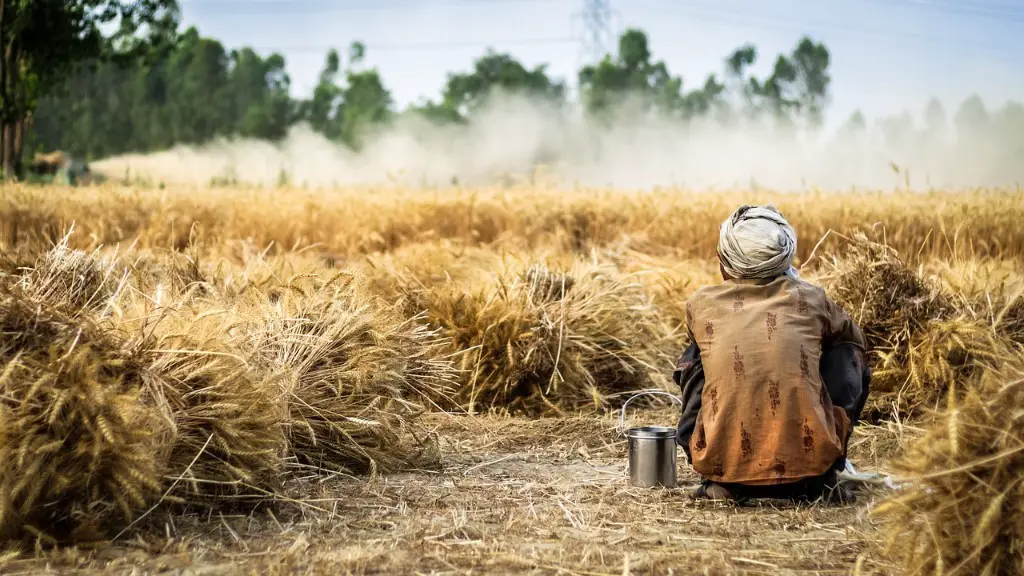Agriculture is a major contributor to economic development. It can help increase agricultural production, provide employment opportunities, and reduce poverty. Agriculture contributes to the Gross Domestic Product (GDP) of any nation and is an important sector of the global economy. With improved technology and agricultural practices, countries have been able to significantly increase their agricultural output, which in turn increases their economic growth.
Agriculture can also provide employment opportunities to people living in rural areas. By providing more agricultural jobs, people can make a living off of their land, giving them the opportunity to bring their family out of poverty. Agriculture can also bring about a decrease in poverty, as agricultural product prices can rise above the level of production costs, leading to increased incomes for those involved.
Agriculture can also stimulate investment in other sectors, such as manufacturing or transport, as businesses look to gain access to the agricultural inputs which are in high demand. With increased agricultural production, businesses can now access the inputs they need to expand production. Additionally, increased agricultural production leads to increased demand for farm machinery and equipment, which can help to create more jobs in the sector.
In addition to contributing to economic development, agriculture can have positive environmental impacts. The use of organic farming methods can reduce pollution and emissions, while also preserving the biodiversity of local ecosystems. By encouraging sustainable agricultural practices, countries can help to conserve and protect their natural resources.
Agriculture also plays an important role in food security. By increasing agricultural output, countries can help ensure that their population has enough food to survive. Also, through improved agricultural practices, countries can help ensure healthy and balanced diets for their citizens.
Finally, agricultural trade is an important factor in economic development. Countries with access to international agricultural markets are able to sell their products to other countries, increasing their economic output. Furthermore, foreign investment in the agricultural sector allows countries to gain access to new technologies, improving agricultural productivity and efficiency.
Improvement of Agricultural Practices
Agricultural practices can be improved to promote economic development. By introducing new farming techniques, such as precision farming, countries can greatly improve their agricultural productivity. Additionally, through increased mechanization, countries can help to alleviate the burden of manual labor and improve the efficiency of agricultural operations. Furthermore, through the introduction of sustainable farming systems, countries can reduce their environmental footprint, while also improving their economic situation.
The implementation of new technology such as genetically modified organisms (GMOs) can lead to increased agricultural production. Genetically modified crops can allow farmers to produce higher yields and reduce their production costs. Additionally, through the use of GMOs, better varieties can be developed more quickly, allowing farmers to better compete in the global market.
To promote agricultural research and development, countries can also invest in agricultural research institutions. By investing in agricultural research, countries can help keep up with the advancement of technology and help to create new and improved agricultural practices. Additionally, by investing in agricultural research, countries can help to keep up with the ever-changing market, as new technologies and improvements arise.
Furthermore, countries can also invest in extension services, which are programs that provide farmers with educational information about new technological advancements and best practices. Extension services help farmers to stay up to date with the latest developments in the field and help them to make informed decisions about their production activities.
Finally, the use of subsidies can be beneficial for economic development. Subsidies are government-funded programs which provide resources to farmers to help them increase their productivity. The use of subsidies can help farmers to maintain a competitive edge, while also providing them with additional resources which can help them to improve their operations and increase their output.
Educational Reforms
Agricultural reforms should also be implemented in order to promote economic development in the agricultural sector. Educational reforms, such as providing more hands-on training and technical assistance to farmers, can help improve the efficiency of their operations. Furthermore, the promotion of agricultural vocational education can help educate the next generation of leaders in the sector.
Improved access to credit for farmers is also essential for economic development. By providing farmers with access to financing, they can invest in new technology and equipment, which can help to increase their productivity. Additionally, access to credit can help farmers to purchase seeds, fertilizers, and other inputs, which can help them to produce higher yields.
Marketing reforms are also needed in order to promote economic development in the sector. The promotion of agricultural cooperatives can help farmers to increase their bargaining power, allowing them to receive a better price for their products. Additionally, through improved marketing, countries can be better connected to international markets, allowing them to export their products for a better price.
Finally, the use of subsidies can be beneficial for economic development. Subsidies are government-funded programs which provide resources to farmers to help them increase their productivity. The use of subsidies can help farmers to maintain a competitive edge, while also providing them with additional resources which can help them to improve their operations and increase their output.
Improved Infrastructure
The improvement of infrastructure is also essential for economic development in the agricultural sector. By investing in roads, bridges, and other infrastructure, it can be easier for farmers to transport their goods in an efficient manner. Furthermore, improved infrastructure can also help to boost employment opportunities in rural areas, as better roads will facilitate easier access to both marketplaces and agricultural inputs.
The provision of electricity and access to water are also important factors in agricultural productivity and economic development. Adequate access to electricity and water can greatly enhance crop production and reduce production costs. Additionally, with access to electricity, farming activities can now be done more efficiently, with automated processes and improved irrigation systems.
The promotion of financial services can also be beneficial to economic development. Financial services, such as credit and insurance, can help to protect farmers from market volatility and help them to cope with difficult economic times. Additionally, access to financial services can also help to promote investment, as access to credit can allow farmers to purchase inputs and upgrade their equipment.
Storage services are also important for economic development in the agricultural sector, as storage services can help to protect against post-harvest losses and help to reduce waste. Additionally, storage services can help to extend the shelf-life of agricultural products, allowing farmers to earn more money in the long-term.
Finally, the use of information and communication technology (ICT) can be beneficial for economic development in the agricultural sector. By using ICT, farmers can access accurate information about the market, as well as potential buyers, which can help them to better manage their operations and make informed decisions.
Role of the Government
The government can also promote economic development in the agricultural sector by implementing policies which are beneficial to the sector. Policies such as loan programs, tax incentives, and subsidies can help to promote investment in the sector and also improve the access to financial services.
The government can also implement policies which are beneficial to small-scale farmers. Through the implementation of policies which lower the cost of inputs, small-scale farmers can have better access to these inputs and reduce their production costs. Additionally, the government can implement policies which provide technical assistance and hands-on training to small-scale farmers, which can help to improve their production methods.
The government should also invest in research and development of new technologies. By funding research and development activities in the agricultural sector, countries can help to stay up to date with the most advanced technologies and help to create new and improved agricultural practices. Additionally, by investing in agricultural research, countries can help to keep up with the ever-changing market, as new technologies and improvements arise.
Finally, the government should also invest in agricultural infrastructure. By investing in roads, bridges, storage facilities, and other infrastructure, countries can help to improve transportation and storage of goods and help to reduce post-harvest losses.
Role of Private Sector
The private sector can also play an important role in economic development in the agricultural sector. The private sector is a major source of investment in the sector, as businesses look to gain access to agricultural products and expand their production. Additionally, the private sector can also provide increased access to finance, as businesses are able to provide access to credit.
The private sector can also provide increased access to technology and improved agricultural practices. By investing in research and development, businesses can help to create new and improved agricultural practices. Additionally, through the development of new technologies and improved irrigation methods, the private sector can help to improve the efficiency of agricultural operations.
The private sector can also invest in marketing activities. Through improved marketing, businesses can be better connected to international markets, allowing them to export their products for a better price. Furthermore, the promotion of agricultural cooperatives can help farmers to increase their bargaining power and receive a better price for their products.
Finally, the private sector can also play a role in providing employment opportunities to people living in rural areas. By investing in agricultural activities and creating jobs, businesses can help to reduce poverty and empower people to make a living off their land.





